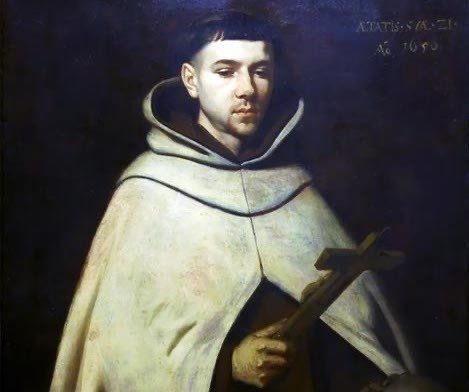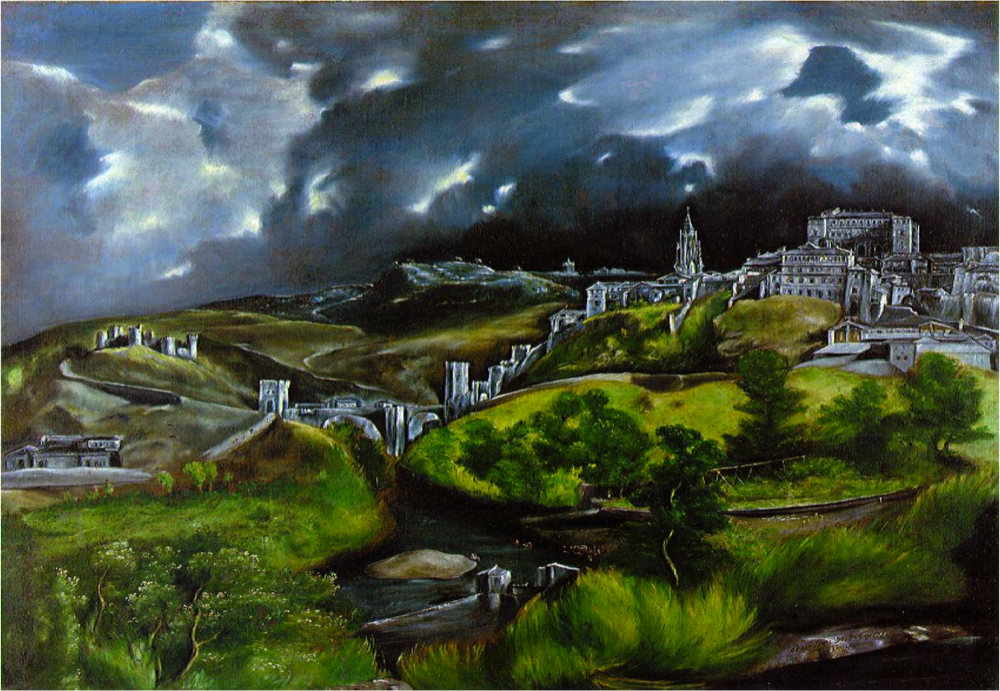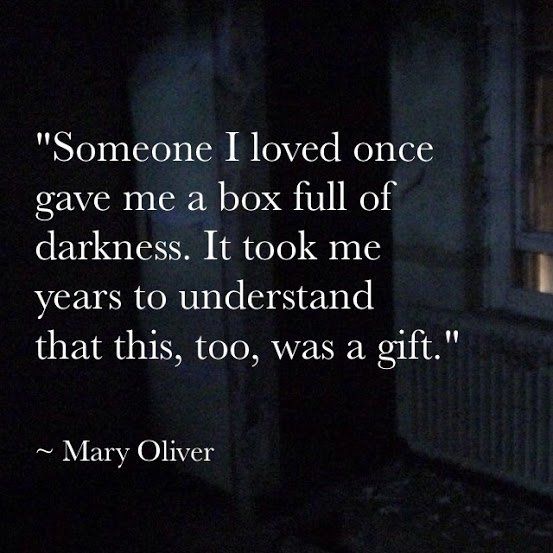Darkness itself is a Gift
Darkness arrives increasingly earlier this time of year, shrinking our days bit by bit. The night is almost over, says St Paul. But still we are in a moment of darkness, This is our Advent.
One of the loveliest, unexpected Advent voices is that of St John of the Cross, whose feast we will keep next week. The saint of the night, the saint of the dark night of the soul.
In Advent of 1577, on the night of 2nd December, John was led bound and blindfolded to a monastery in Toledo where his own brothers imprisoned him. How Christians sometimes treat each other! The oldest Spanish landscape painting is one by El Greco, a contemporary of John. By chance El Greco depicts the priory in which John was held captive, just below the old Moslem Alcazar, high up on cliffs. He paints the city as a dark brooding presence at almost at the same moment in history as John was imprisoned within. They were dark days. There have always been dark days.
John was there because he had refused to renounce his work with Teresa of Avila, a work of much-needed reform for the Church. He was confined to a room six feet wide and ten feet long without air or light except for whatever filtered through a small slit high up in the wall. He survived on bread and water. He was not allowed to bathe or change his clothes. His only excursion was to be brought down to the Refectory to receive the discipline of being publicly flogged by other monks. That was John’s Advent of 1577.
Yet it was there, in that small prison cell that John began to compose a poem first by memorising the words in the dark and later, thanks to a kind jailer, by writing them down. Nine months later he would miraculously escape, carrying in his pocket the manuscript of this poem that is one of the masterpieces of the Spanish Language. “On a dark night, on fire with love's deepest yearnings, oh, blessed chance, unnoticed I left my home, my house being now all stilled. Oh, night that guided me, oh, night more gentle than the dawn.”
For him the darkness was a place of discovery. On that dark night he composed a song of love, a human drama, of lover and beloved. He sang of the painful joy of seeking the most elusive lover of all, Christ himself. The night is not a negative image for John but a positive one, for the night was his moment of escape – when he found his freedom. The night was just the beginning of the journey.
The American poet Mary Oliver wrote: “Someone I loved once gave me a box full of darkness. It took me years to understand that this too, was a gift.” “The Uses of Sorrow” by Mary Oliver, from Thirst, 2007. Beacon Press.
We might think of the darkness of Advent as our particular gift. Advent days, if we use them well, can deliver stillness and focus, quiet reflection. The darkness can draw us inwards to honest reflection. Days to make us tender, because we may have been dealt a hand of dark suffering. But days of hope, because we also know of the dawn.
The night for John is a moment to focus on what really matters in life and what is extraneous, unnecessary. The night is there to declutter us of all that is not life-giving . He cautions us to not be distracted by the tinsel things, the trivial substitutes that we have for life with God. He says the night is God's best gift to us , intended for our liberation. Have we settled for something less than the true joy that God wants to give us, the life he wants us to live to the full with others, the love which is meant to permeate our being? Do I just cling to things that make me feel good and comfortable? Advent invites us not to rush to Christmas, not to get too caught up in the materialist bonanza that is going on, but to savour the dark days as a gift.
Pope John Paul thought the whole of Western Europe was going through a dark night of the soul. Certainly, our country seems to be in a pretty dark place and election time merely amplifies the hostility, division and rancour. An election could be a time of positive impetus to move the country forward with fresh ideas. One commentator this week spoke of feeling depressed, disenfranchised, disillusioned, disappointed and disgusted at the state of our politics. The quality of leadership, the lies and half-truths, the promises of bread and circuses if only we lend them our votes. These dark days of Advent are for us to reflect on the true values we seek and who is best fit to represent us and lead the country forward. Perhaps it comes down to character. The character of those individuals we choose to elect.
Then we are reminded of the terrorism, the anger and hatred into which our world has sunk. The twisted ideologies that make someone attack innocent victims on London Bridge. But then in this darkness we see amazing heroism: When the terrorist had already killed two people and injured others, two men – one with a large tusk, the other with a fire extinguisher go after him even though he’s wearing a suicide vest which they don’t know is fake. And just when everyone is cheering our British heroes we learn that one of them is a Polish immigrant, and another who came to the rescue a convicted murderer.
The world may be dark but we are a people of hope, and Advent is a time to exercise our hope muscles. We dream of a Kingdom of love, truth, justice and peace, that comes about only as each of us becomes the light of Christ in the world. “And soul by soul and silently her shining bounds increase, and her ways are ways of gentleness, and all her paths are peace.”
“The night is almost over, it will be daylight soon”, says St Paul. Pope Benedict wrote of the meaning of this season that we are entering:
"Advent reminds us, therefore, of two things: first that God’s presence in the world has already begun , that he is present, albeit in the hidden manner; second that his presence has only begun and is not yet full and complete, that it is in a state of development, of becoming, and maturing toward its full form. His presence has already begun and we, the faithful, are the ones through whom he wishes to be present in the world . Through our faith, hope, and love he wants his light to shine over and over again into the nights of the world." Joseph Ratzinger, Pope Benedict, Dogma and Preaching p.321
We can use Advent well to reflect on what we want to be as individuals and as a people. Let us enjoy these dark days: “Someone I loved once gave me a box full of darkness. It took me years to understand that this too, was a gift.”












